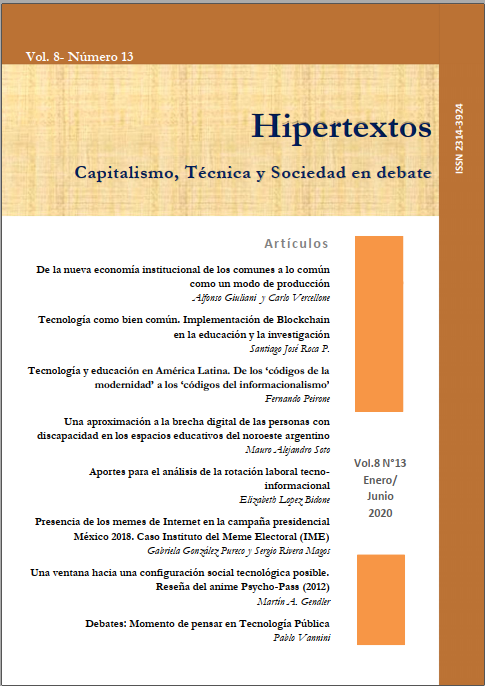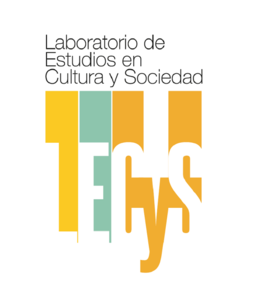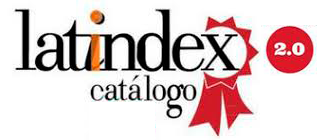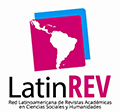From New Institutional Economics of the Commons to the Common as a Mode of Production
DOI:
https://doi.org/10.24215/23143924e009Keywords:
commons, common in the singular, mode of production, political economy of the commons, cognitive capitalismAbstract
The purpose of this article is to describe the origin, the meaning, and the issues at stake in the debate that has developed around this recent area of research of the common and reformulate the notion of the common in a post-socialist context of overcoming capitalism. This article will first of all consider the contributions, but also the limits, of Ostrom's approach, which have led a number of researchers to formulate alternative approaches. Secondly, therefore, we will present the theories of the common in the singular. After a critical analysis of the most salient aspects of Dardot and Laval’s (2014) political and normative theory, we will turn our attention to the neo-operaista idea of the common as a mode of production. We will present the theoretical and conceptual framework of this idea to show how the commons constitutes a social-economic system that is derived from the internal contradictions of cognitive capitalism and offers a global alternative to a representation of society and economics based on the State-Market diarchy.
Downloads
References
Bettelheim, Ch. (1970). Problèmes Théoriques et Pratiques de la Planification (Theoretical and Practical Problems of Planning). Paris: Maspero.
Bauwens, M. (2016). Sauver le monde (Save the World -Toward a Post Capitalist Society with P2P). Paris: Les liens qui libèrent.
Benkler, Y. (2004). Common Based Strategies and the Problem of the Patents. Science, 305 (5687): 1110-11
Boyle, J. (2003). The Second Enclosure Movement and the Construction of the Public Domain. Law and Contemporary Problems, 66: 34-74.
Coriat, B. (2015) (ed.) Le Retour des Communs. La crise de l'idéologie propriétaire (The Return of Commons. The crisis of the proprietary ideology). Paris: Les Liens qui Libèrent.
Coutrot, Th. (2018). Libérer le travail (To Free Work). Paris: Seuil.
Dardot, P. and Laval, Ch. (2014). Common. On Revolution in the 21st Century. Translated by Matthew MacLellan. London: Bloomsbury.
David, P. A . and Foray, D. (2002). Une introduction à I'économie et à la société du savoir (An lntroduction to the Economy and Knowledge-Based Society). Revue internationale des sciences sociales, 171: 13- 28.
Comissione Rodotà (2007). Commissione Rodotà -per la modifica delle norme del codice civile in materia di beni pubblici (14 giugno 2007)-Proposta di articolato (Propasal for an amendment of the norms of thc civil code on matters of public goods). https://www.giustizia.it/giustizia/it/mg_1_12_1.wp?contentId=SPS47617.
Gambetta, D. (1992). La Mafia Siciliana. Un 'Industria della Protezione Privata (Sicilian Mafia: a Private Security lndustry). Torino: Einaudi.
Gorz, A. (1977). The Division of Labour: The Labour Process and Class Struggle in Modern Capitalism. Hassocks: Harvester Press.
Gorz, A. (2008). Ecology as politics. Translated by Patsy Vidgerman and Jonathan Cloud. Montréal: Black Rose Books Ltd.
Hardin, G. (1968). The Tragedy of the Commons. Science, 62 (3859): I243-48.
Hardt, M. and Negri, A. (2009). Commonwealth. Cambridge, MA: Harvard University Press.
Hess, Ch. and Ostrom, E. (2007) (eds.). Understanding Knowledge as a Commons: From Theory to Practice. Cambridge, MA: MIT Press.
Laloux, F. (2015). Reinventing Organizations: Vers des communautés de travail inspires (Reinventing Organizations: Towards Inspired Work Communities). Diateino: Paris.
Lomazzi, L. (2018). Approches critiques de la captation et de l'exploitation des donnés numérique. Vers une politique du commun? (Critical Approaches to Capturing and Exploiting Digital Data: Toward a Politics of the Common?). In Big Data and Society: Industrialization of Symbolic Mediations. Edited by André Mandoux and Mare Ménard, 211-32. Québec: Presses de I'université du Québec.
Lomazzi, L. and Ménard, M. (2018). Où en est la théorie du/des commun(s)? Vers une économie politique culturelle (Where is the theory of the common(s)? Toward a Cultural Political Economy) tic&société 12(1): 69-93. 10-40oo/tic&societe.2381
Loveluck, B. (2015). Internet, une société contre l'Etat? Libéralisme informationnel et économies politiques de l’auto-organisation en régime numérique (Internet, a Society against the State? Informational Liberalism and Political Economies of Digital Self-organization). Réseaux, 4 (192): 235-70. 10.3917/res.192.0235
Marx, K. [1875] (2009). Critique of the Gotha Programme. Gloucester, UK: Dado Press.
Mattei, U. (2012) Beni comuni. Un Manifesto (Common Goods: A Manifesto). Laterza: Roma·Bari.
Monnier, J-M. and Vercellone, C. (2014). The Foundations and Funding of Basic Social Income as Primary Income. A Methodological Approach. Basic Income Studies, 9 (2): 59-77.
Negri, A. (2016). Il commune come modo di produzione (The Common as a Mode of Production). Euronomade, March 27. www.euronomade.info/?p=7331
Negri, A. (2014). La metafisica del comune (The Metaphysics of the Common). Il Manifesto, May 6. https://ilmanifesto.it/la-metafisica-del-comune/
Ostrom, E. (1990). Governing the Commons. The Evolution of Institution for Collective Action. Cambridge: Cambridge University Press.
Ostrom, E. and Hess, CH. (2010) Private and Common Property Rights. In Encyclopedia of Law and Eeonomics. Edited by Boudewijn Bouckaert, 53-106. Northampton, MA: Edward Elgar.
Rifkin, J. (2014). The Zero Marginal Cost Society: Internet of Things, the Collaborative Commons, and the Eclipse of Capitalism. New York: Palgrave Macmillan.
Robertson, B. J. (2015). Holacracy: The New Management System for a Rapidly Changing World. New York: Henry Holt and Company.
Sauvêtre, P. (2016). Quelle politique du commun? (Which politics of the common?). SociologieS. October 19: 1-13. https://journals.openedition.org/sociologies/5674
Schlager, E. and Ostrom, E. (1992). Property-Rights Regimes and Natural Resources: A Conceptual Analysis. Land Economics, 68 (3): 249- 62.
Vercellone, C. et al. (2015) Managing the Commons in the Knowledge Economy: Decentralized Citizens Engagement Technologies. Report D3.2, D-CENT. https://dcentproject.eu/wp-content/uploads/2015/07/D3.2-complete-ENG-v2.pdf
Vercellone, C., Brancaccio, F., Giuliani, A. and Vattimo, P. (2017). Il Comune come Modo di Produzione. Per una critica dell'economia política dei beni comuni. (The Common as a Mode of Production. Towards a Critique of the Political Economy of Common Goods). Verona: Ombre Corte.
Vibert, S. (2016). L'institution de la communauté (The Institution of the Community). SociologieS. October 19. https://journals.openedition.org/sociologies/5683#quotation.
Weinstein, O. (2013). Comment se construisent les communs: questions à partir d’Ostrom (How the commons are built: Cuestions from Ostrom). In Le retour des communs: la crise de l'idéologie propriétaire, edited by Benjamin Coriat. 69-86. Paris: Editions les Liens qui libèrent.

























